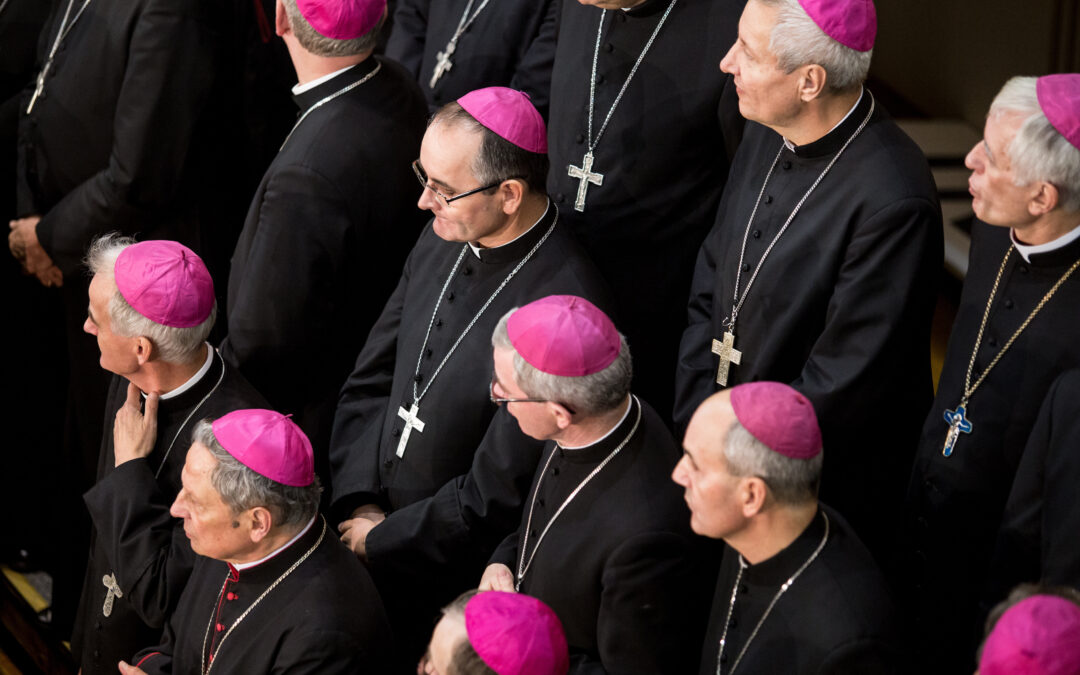Poland’s Catholic episcopate has called for the country to withdraw from a European convention on combating violence against women and domestic violence, warning that it “introduces gender ideology”.
Their call comes amid renewed debate over the treaty, known as the Istanbul Convention. In July, the justice minister began the process of Poland’s withdrawal, saying the treaty “promotes LGBT”. The issue was subsequently sent by the prime minister to the constitutional court for an opinion.
In their statement, the head and deputy head of the Polish Episcopal Conference (KEP), the central organ of the Catholic church in Poland, say that they “welcome the emergence of an…initiative to terminate the Istanbul Convention”.
The signatories, Archbishops Stanisław Gądecki and Marek Jędraszewski, note that they support the convention’s attempt to “combat discrimination resulting from differences in sex – that is, biological differences between a woman and a man”.
However, what they oppose is the fact that, in addition to this goal, the convention “introduces elements of gender ideology” by seeking to establish the idea of “socially constructed” identities rather than biologically defined ones.
Such criticism has been at the root of opposition to the Istanbul Convention in Poland and some other Central and Eastern European countries. The Polish episcopate opposed Poland’s ratification in 2015, as did the current ruling conservative Law and Justice (PiS) party, which was then in opposition.
In 2014, Zbigniow Ziobro, who is now justice minister, called the convention a “feminist invention that is meant to justify gay ideology”. He declared that “you don’t need a convention to [know that] you cannot beat a woman; you can just read the gospel”.
The convention is an initiative of the Council of Europe. It has been signed by all 47 countries that belong to the organisation apart from Russia and Azerbaijan. A further 11 countries – including the United Kingdom, Ukraine and Hungary – have signed but not ratified the convention.
Appalling #Poland court decision shows flaws in outdated national rape law & why it matters that gov't remains party to #IstanbulConvention – and implements it. @notesfrompoland https://t.co/NgriH8WS5J pic.twitter.com/l39Z2a9fOF
— Hillary Margolis (@hillarymargo) September 18, 2020
In their statement, the archbishops also claim that the convention identifies religion and tradition as causes of violence against women. (Article 12 of the convention says that “parties shall ensure that culture, custom, religion, tradition or so-called ‘honour’ shall not be considered as justification for any acts of violence”.)
They express concern at the convention’s call for the teaching of “non-stereotyped gender roles” and “promot[ing] changes in the social and cultural patterns of behaviour of women and men with a view to eradicating prejudices, customs, traditions and all other practices which are based on the idea of the inferiority of women or on stereotyped roles for women and men”.
The episcopate’s leaders do, however, emphasise that they “support all changes in Polish criminal law which serve even greater protection and security of family life”.
They call for such efforts to focus on combatting substance abuse as well as the “pornographication of mass culture and the related objectification of women and dehumanisation of sex life”. These are the “main sources of crisis in family life”, say the bishops.
The archbishops suggest that, after withdrawing from the Istanbul Convention, Poland should instead adopt the alternative “Convention on the Rights of the Family” that has been put forward by Ordo Iuris, an ultraconservative legal organisation.
On its website, Ordo Iuris – which has been behind efforts to pass anti-LGBT resolutions by Polish local authorities, oppose sex education in schools and ban abortion – says that its convention is “an opportunity to stop harmful leftist ideologies” by protecting “the most discriminated social group, the family”.
The European Parliament's lead rapporteur on the Istanbul Convention on violence against women dispels five myths about it that have been used by conservatives in Poland and elsewhere to argue for a withdrawal, including that it promotes "gender ideology" https://t.co/0zplRdZY5D
— Notes from Poland 🇵🇱 (@notesfrompoland) September 9, 2020
The church remains an influential force in Poland, where 92% of the population are Roman Catholics and almost 70% say that God plays an important role in their life.
A poll earlier this year, however, showed that the church has seen a greater decline in trust than any other major Polish institution, amid scandals over clerical sex abuse and allegations it has been covered up.
Although it formally remains outside politics, the episcopate does make its views known on certain policy issues. Last year, Archbishop Gądecki criticised Poland’s conservative ruling party for its failure to fulfil a promise to ban abortion.
Main image credit: Jakub Orzechowski / Agencja Gazeta

Daniel Tilles is editor-in-chief of Notes from Poland. He has written on Polish affairs for a wide range of publications, including Foreign Policy, POLITICO Europe, EUobserver and Dziennik Gazeta Prawna.




















